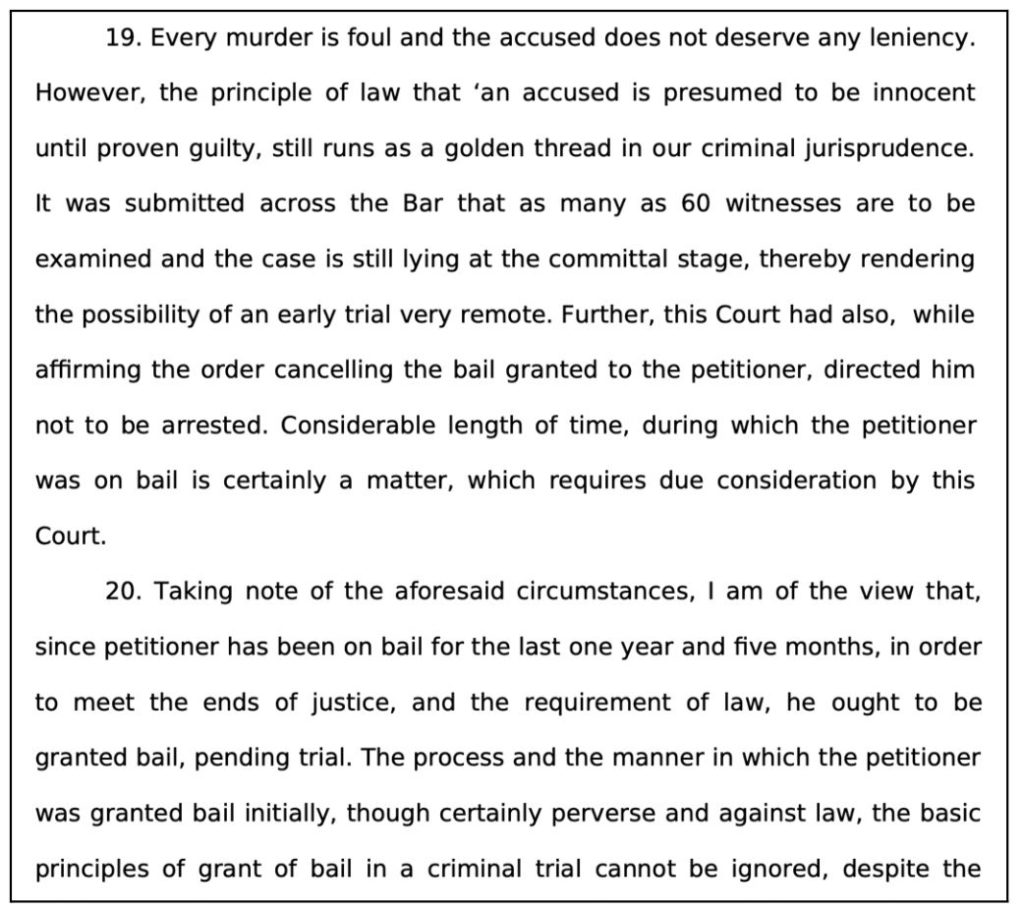In this week’s review of Court Judgments, we look at Karnataka High Court’s order regarding non-requirement of Father’s consent for issuance of passport of minor child when mother holds the exclusive custody, J&K&L High Court’s observation regarding the husband’s responsibility to clearly communicate the divorce, Telangana High court’s change in sentence with respect to murder conviction, Delhi High Court’s conviction of a rape accused who was earlier acquitted and Kerala High Court’s observation regarding a bail application.
Karnataka HC: Passport Officer can’t insist on Father’s consent where Mother holds exclusive custody of Minor
In the case Poulami Basu vs. The Government of India, Karnataka High Court stated that once exclusive custody of a child is granted by the Family court to a mother, the Regional Passport officer cannot insist upon the presence of the father of the child for his consent to issue a passport to the child.
A petition was filed in the Karnataka High Court by a woman, Poulami Basu, seeking direction from the passport authority to consider the application to issue a passport to her minor child.
She was earlier awarded exclusive custody of the child by the Family Court as part of the Divorce Decree. The government had opposed the plea, stating that the grant of a passport is regulated by the Passport Act, 1967. As per the manual issued under the act, the consent of the estranged husband is a pre-condition for the grant of a Passport.
The single judge bench of Justice Krishna S Dixit went through the case and said that the petitioner is justified to contend that a Passport is only a travel document that enables the grantee to pass the country and it does not enable them to travel abroad unless the Visa is granted by the intended host country. As per the ‘Divorce Decree’ by the Family court, the ex-husband was granted limited visitation rights which would not be curtailed by the mere grant of a Passport. Any apprehension of curtailment of such rights in case of visa-less travel abroad can be alleviated by prior permission of the Family Court. Hence it is not justified for the ‘Regional Passport Officer’ to insist upon the presence of the father. The Court allowed the petition and gave the necessary direction to the Passport Officer.
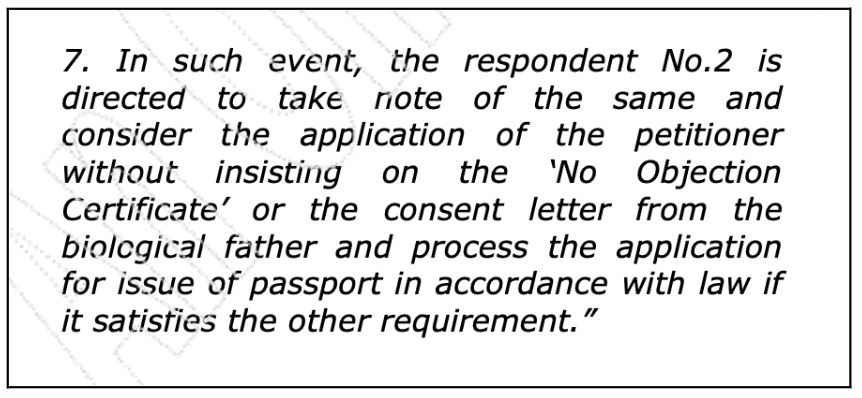
Telangana HC: Killing someone on sudden quarrel & under involuntary intoxication amounts to ‘Culpable Homicide not amounting to Murder’
A bench of Telangana High Court consisting of Justice A. Venkateshwara Reddy and Justice G. Anupama Chakravarthy, altered the conviction of an accused from the punishment of murder to ‘Culpable Homicide not Amounting to murder’, as the offence was committed in a heat of sudden passion in highly inebriated stage, which itself was involuntary.
A Criminal Appeal was filed in the Telangana High Court against the judgment in the Sessions court, where-in the accused was found guilty of murder punishable under Section 302 of the IPC and was sentenced to Life imprisonment. As per the Case details, Accused (A1) was the son of the deceased and A2 was the brother of the deceased.
There was a land dispute between the brothers which developed into enmity. As per the prosecution, A1 was instigated time and again by A2 to kill his father (deceased) by making him addicted to liquor. One day, A1 returned home at around 11 PM and was scolded by his father for not completing a few of the chores. A1 picked up a quarrel for insulting and scolding him in public. He proceeded to beat the father and pushed him, following which the father collapsed. A1 poured kerosene and set him on fire. The elder son registered a case and the trial court found A1 guilty of murder.
The counsel for A1 contended that as per the dying declaration of the deceased, A1 was in an intoxicated condition. Therefore, based on the dying declaration, A1 has only inflicted burn injuries and had no intention to kill the deceased. Hence, the offence may not fall under Section 302 of IPC but at most falls under Section 304 Part II of IPC i.e., Punishment for Culpable Homicide not amounting to murder.
The Court looked into the arguments presented and made certain observations. As per the declaration of the deceased, A1 was in an inebriated state. This was not the voluntary doing of self but was encouraged to drink by A2, as per the presentation of prosecution. Further, there was no enmity between A1 and the deceased.

The court relied on an earlier judgment by Rajasthan High Court in the case of Kalu Ram vs State of Rajasthan. It observed that the offence commuted may fall under Exception 4 of Section 300 IPC i.e., culpable homicide is not murder if it is committed in a sudden fight in the heat of passion upon a sudden quarrel.
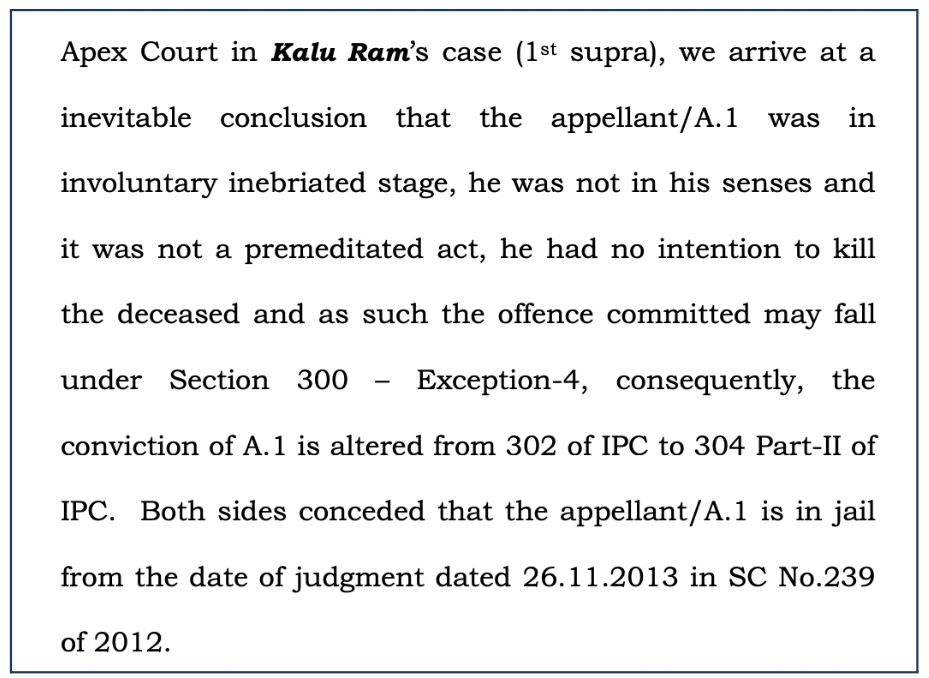
Accordingly, the Criminal Appeal was partly allowed and the conviction of A1 was altered.
Delhi HC: Convicts a man for raping 11-year-old, 10 years after the acquittal by trial Court
In the case State vs. Rahul, Delhi High Court convicted a man to 10 years of rigorous imprisonment for raping an 11-year-old, after over 10 years of being acquitted by a trial court.
In April 2010, the minor victim was returning from school and went to a public toilet. A man following her forcibly took her to a male toilet and committed rape on her. The incident was reported to the police after seven days. The man was apprehended a few days later and taken into police custody. He was acquitted by the trial court on 20 October 2011, based on the benefit of the doubt by holding that the prosecution had failed to prove the case beyond a reasonable doubt.
The status report filed by the prosecution in November 2013, stated that the man was not seen around his residence for long and could not be traced. An appeal was filed by the prosecution in Delhi High Court in 2014 against the trial court order. The High Court directed the initiation of proclamation proceedings against him under sec. 82 & 83 of CrPC.
The High court highlighted the various omissions and errors committed by the trial court in the case. The Delhi High Court bench comprising of Justice Mukta Gupta and Justice Mini Pushkarna observed that the trial court ignored the fact the victim has earlier lost her mother at a young age and her father was also missing. She was staying with her aunt who was looking after 10 children (6 her own, and 4 of her brother’s including the victim). She was working as a daily labourer and in view of the state of affairs cannot be expected to have the knowledge or be in a state to immediately report the incident.
The High court also pointed out the general reluctance in society to report such incidents. Therefore, not lodging an FIR immediately cannot be considered a factor in the case.
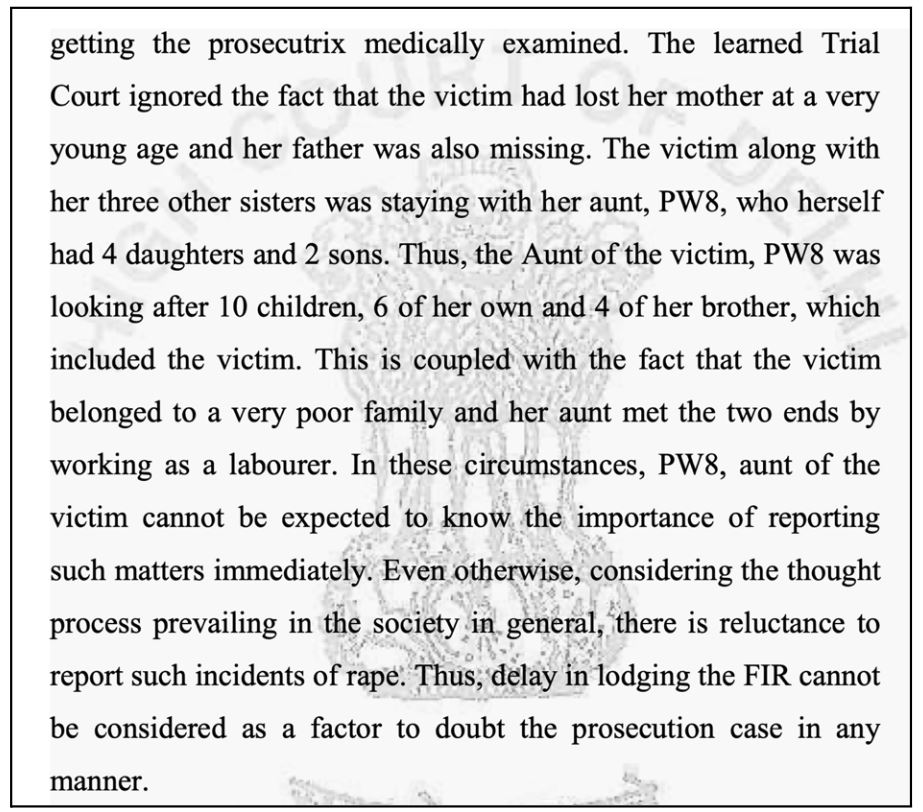
The High Court further pointed out that the trial court made an error in holding the victim as a tutored witness by stating that she told whatever her aunt and police told her to say. It further highlighted that since the victim and her family belong to economically and educationally backward backgrounds, they cannot be expected to hold on to the evidence.
The High court considered the appeal of the prosecution and proceeded to convict the accused of the crime of raping a minor child.
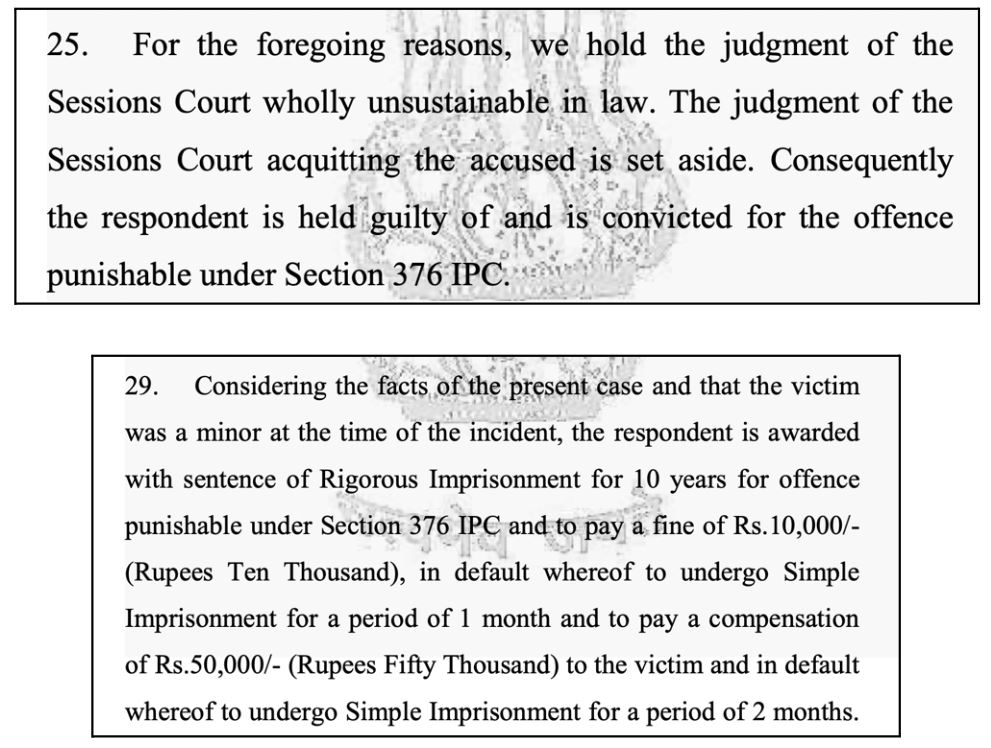
J&K&L HC: Muslim husband cannot avoid his liability to maintain unless divorce is validly pronounced and communicated.
In the case, Mohammad Ali Bhat vs. Shafeeqa Bano & Ors, a plea was filed by the petitioner challenging the maintenance order by Chief Judicial Magistrate, Budgam, on the ground that a divorced Muslim wife is not entitled to maintenance and even interim maintenance cannot be granted in her favour. The petitioner informed the court that the first respondent of the case was divorced as per the terms of communication by Anjuman Sharie Shiaan, J&K, and hence is not entitled to any maintenance.
The main question before the court was whether the production of the document issued by Anjuman Sharie Shiaan, J&K, would conclusively or even prima facie show that the respondent has been divorced by the petitioner and if this in turn affects the entitlement of the maintenance claim.
The bench comprising of Justice Sanjay Dhar observed that for a Muslim husband to avoid liability to maintain a wife on the ground that he has divorced his wife, he not only has to show that the divorce was validly pronounced as per Muslim law but also show that this has been properly communicated to the wife.
The court referred to the judgment in earlier cases including the Supreme Court’s Shamim Ara vs. State of U.P. & Anr .
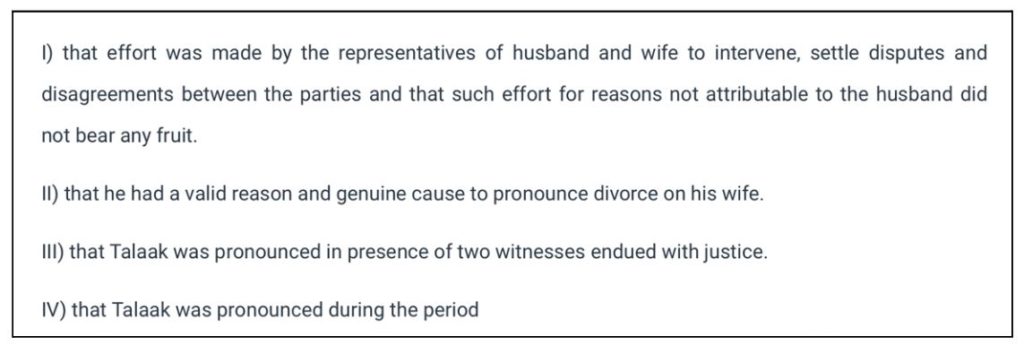
The court observed that the burden is on the petitioner to prove that the divorce was properly communicated. It stated that unless he discharges the burden of proof, he cannot wriggle out of the maintenance and proceeded to dismiss the petition.
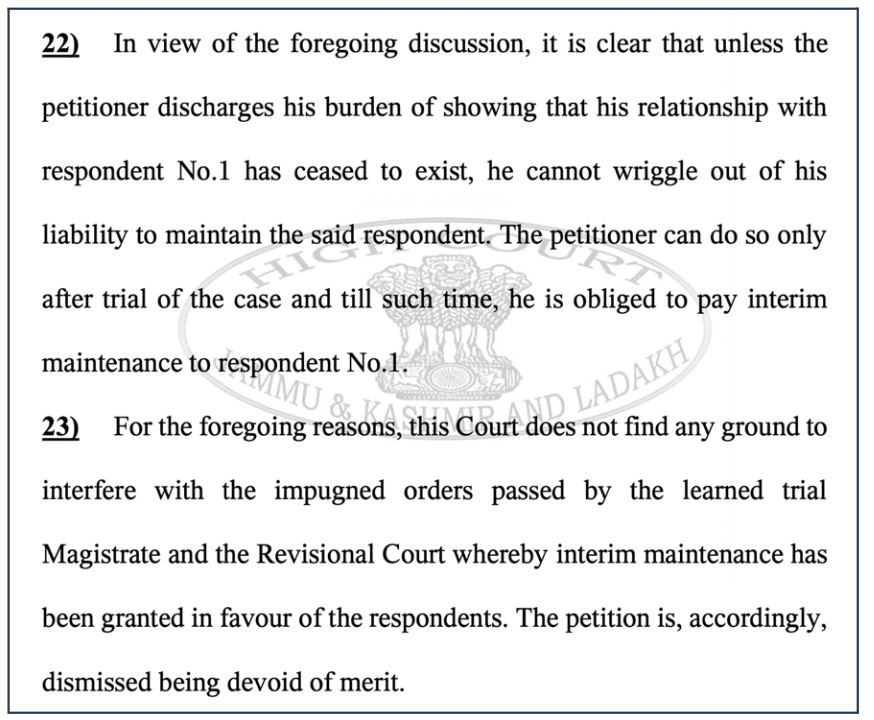
Kerala HC: Bail can’t be denied by ignoring the basic tenets merely because accused was earlier released by incompetent court
Kerala High court has granted bail to a person accused of killing his wife, with an observation that merely because he was earlier released on bail due to incompetent jurisdiction, he cannot be denied bail as per the tenets of criminal jurisprudence. It highlighted that as per the basic tenets, the accused is presumed to be innocent until proven guilty. The court granted bail to the petitioner in the case, Arun v. State of Kerala & Anr.
The petitioner was accused of smothering and electrocuting his wife to death. After the arrest, the accused approached the High Court with a bail application, which was rejected. Later, a Magistrate court granted the bail without any conditions. The State sought the cancellation of the bail before the Sessions Court. The Sessions judge noticed the illegality of the order passed by the magistrate and also because the High Court has earlier cancelled the bail, issued an order to cancel the bail.
The petitioner approached the High Court, which initially affirmed the cancellation order, but stated that he has the freedom to apply for regular bail. The counsel on behalf of the petitioner contended that the wrong order of the Magistrate cannot be a reason to deny the bail. The Counsel appearing on behalf of the complainant contended that the grave nature of the crime requires the court to deny the bail, and also that the accused benefited from the wrong order.
The single judge bench of Justice Bechu Kurian Thomas observed that the circumstances prima facie reveal the ghastly crime, but the facts are for consideration by the trial court during the trial. In view of the stage of the case, the court observed that the bail cannot be denied as ‘Bail is the rule, and jail is an exception.’
It stated that although the accused benefitted from the earlier bail order, the illegality of the court cannot be a factor in denying the accused bail.
